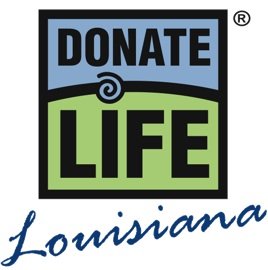Save the lives of up to 8 people through organ donation.
Enhance the lives of more than 75 through tissue donation.
Restore sight to 2 people through eye donation.
More than 100,000 people are waiting for a life-saving transplant in the U.S.
Approximately 2,000 people in Louisiana are waiting for the gift of life.
Facts about Donation

All Facts, No Myths
-
Throughout the entire donation process, your loved one is treated with the utmost respect and dignity.
-
Anyone can be a potential donor, regardless of age, race, medical history or HIV status.
-
All major religions support donation and see it as a final act of love and generosity towards others.
-
Donation will only take place after all efforts are made to save someone’s life are exhausted.
-
Any costs associated with donation will not be passed to you or your family.
-
Donation does not disfigure the body or interfere with open casket funeral.
-
Individuals awaiting an organ transplant are prioritized by medical urgency.
-
The waiting list does not reference race, gender, age or social status.
-
Living donation, facilitated by transplant centers, can also make a huge impact. As the waiting list for organs such as kidneys increase, more and more people are deciding to become living donors. Whether it is a direct donation or a paired donation, living kidney or liver donors are able to lead healthy lives while saving the life of another.
Living donation is not part of deceased donor registration in the Louisiana Donor Registry. A living donor transplant program must be contacted by the potential donor, and they will conduct an evaluation determining eligibility for living donation.
LIVING DONATION PROGRAMS IN LOUISIANA
Children’s Hospital-Nephrology
Tulane Medical Center Transplant Institute
-
Anatomical Donation, or Whole Body to Science Donation, is the act of giving one’s body after death to a facility for education and/or research purposes.
The Bureau of Anatomical Services (BAS), functioning under Louisiana law, is responsible for the procurement, use and disposition of the remains which are donated. Remains donated to the BAS are assigned to one of its member institutions: LSU Schools of Medicine or Dentistry at New Orleans, LSU School of Medicine at Shreveport or Tulane University Medical Center.
-
Donating bone marrow and blood are also ways people can help those in need. Those are also facilitated by other organizations like Be The Match and local blood banks.
Other types of donation
Fun Fact
Louisiana has one of the oldest donor registries in the U.S. and over 2.5 million people have made the decision to be a donor in our state. The Louisiana registry is promoted through Donate Life Louisiana, a statewide collaboration of organizations who educate and advocate for the gifts of organ, eye and tissue donation.
Together we offer hope to the more than 2,000 Louisianians who are waiting for a life-saving transplant and the countless others whose lives are enhanced by cornea and tissue donation.


